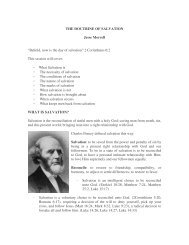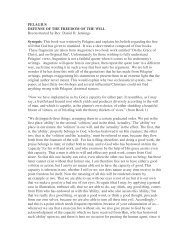Does_God_Take_Away_Free_Will_Jesse_Morrell 2.pdf - PinPoint ...
Does_God_Take_Away_Free_Will_Jesse_Morrell 2.pdf - PinPoint ...
Does_God_Take_Away_Free_Will_Jesse_Morrell 2.pdf - PinPoint ...
Create successful ePaper yourself
Turn your PDF publications into a flip-book with our unique Google optimized e-Paper software.
for us, and that Christ bore the sins of the whole world. It was the<br />
world that esteemed Jesus as a sinner (Isa. 53:3-4; 53:9; 53:12;<br />
Heb. 12:2-3), who numbered Him with the transgressors (Mk.<br />
15:28-32; Lk. 22:37). Jesus was treated as a sinner by the world<br />
(Isa. 53:12; Lk. 23:33). It was the world that considered Jesus to be<br />
a sinner and treated Him as such, but <strong>God</strong> viewed Jesus exactly as<br />
He was, as a spotless sin offering being made for the sin of the<br />
world. If Jesus was not morally sinless at His death, His offering<br />
would not have been acceptable unto <strong>God</strong>; His blood atonement<br />
would not be an adequate substitute for the punishment of hell<br />
because it would have lost its purity and value.<br />
Jesus was forsaken of <strong>God</strong> (Matt. 27:46; Mk. 15:34) but not<br />
relationally separated (Jn. 8:29) because of any sin (Hab. 1:13; 2<br />
Cor. 6:14). He was always pleasing to His Father (Matt. 3:17; 17:5;<br />
Mk. 1:1; Lk. 3:22; Jn. 8:29; 2 Pet. 1:17), especially during the<br />
crucifixion (Isa. 53:10-11). But He was forsaken in the sense that<br />
the Father gave the Son over into the hands of wicked men to be<br />
crucified (Matt. 17:22; 26:35; Mk. 14:41; Lk. 24:7; Acts 2:23),<br />
when He lifted up the protection He previously had over the Son<br />
(Matt. 4:6; Lk. 4:11; Jn. 7:30; 10:31; 10:39). The Son was forsaken<br />
by the Father only in that the Father was “far from helping” or<br />
delivering the Son (Ps. 22:1). Pilate had no power over Jesus<br />
except what the Father gave to Him (Jn. 19:11). It was wicked men<br />
who actually crucified Jesus (Mk. 12:7; 27:35; Mk. 15:24-25; Lk.<br />
20:14-15; 23:33; 24:20; 24:7; Jn. 19:18, 23; Acts 2:23; 2:36; 4:10;<br />
1 Thes. 2:14-15). The Apostle Creed says that Jesus “suffered<br />
under Pontius Pilate”. That is because it was Pilate who<br />
“delivered” Jesus to be “crucified” (Matt. 27:26; Mk. 15:15; Lk.<br />
24:7; Jn. 19:16). In this same way the Father can be said to be the<br />
one who bruised the Son (Isa. 53:10), in the sense that the Father<br />
gave the Son over as an offering, lifting up the protection that He<br />
once had over the Son, delivering His Son as a sacrifice for the sins<br />
of the people. As the hymn says, “<strong>God</strong>, His Son not sparing, sent<br />
Him to die…” <strong>God</strong> spared not His Son but delivered Him for all<br />
mankind (Rom. 8:32). The Father bruised the Son only in the sense<br />
that He made “his soul an offering for sin” (Isa. 53:10), but not in<br />
the sense that the Father directly bruised Him, or that the Son was<br />
under the wrath of the Father, or that the Son was personally<br />
crucified by the Father directly.<br />
5. The atonement is not limited in its intention or purpose.<br />
Christ died for all men (Isa. 45:22; 53:6; 55:1; Eze. 18:30-32; Matt.<br />
23:37; Mk. 16:15-16; Lk. 2:10-11; Jn. 1:29; 3:16; Rom. 2:11; 5:15;<br />
Heb. 2:9; 2 Cor. 5:14-15; 1 Tim. 2:11; 4:10; Tit. 2:11; Heb. 2:9; 2<br />
Pet. 2:1; 1 Jn. 2:22; Rev. 3:20) because all men have chosen to<br />
become sinners (Isa. 52:3; 53:6). There is no partiality with <strong>God</strong><br />
(Rom. 2:11; 2 Pet. 1:17), <strong>God</strong> wants everyone to repent and be<br />
saved (Ps. 145:9; Eze. 18:32; 33:1; Acts 17:30-31; 2 Pet. 3:9). The<br />
atonement does not make salvation automatic for a few, but it<br />
makes salvation available to all men, it makes forgiveness possible<br />
to everyone. Salvation is a gift that <strong>God</strong> offers to all to accept and<br />
receive (Jn. 1:11-12; Lk. 14:16-24; Rom 5:18) through a decision<br />
(2 Cor. 5:20) to repent and believe, though many reject <strong>God</strong>’s<br />
gracious offer (Isa. 65:2; Lk. 7:30; 14:16-24; Jn. 1:10-11; Rom.<br />
10:21; 2 Thes. 1:8; 1 Pet. 4:17) and resist His grace (Gen. 6:3; Lk.<br />
7:30; Acts 7:51). <strong>God</strong> is trying to save all men (Jn. 3:16; 6:44-45;<br />
12:32; 16:8; Acts 17:30-31; 2 Pet. 3:9). <strong>God</strong> gives light to all men<br />
(Jn. 1:9), <strong>God</strong> is convicting all men (Jn. 16:8), <strong>God</strong> is drawing all<br />
men (Jn. 6:44-45; 12:32), <strong>God</strong> is calling all men (Matt. 11:28;<br />
22:9; Lk. 5:32; Acts 17:30; Rev. 22:17), and <strong>God</strong>’s grace has<br />
appeared to all men (Rom. 5:15; Tit. 2:11-12). The atonement<br />
makes salvation automatic and unconditional for none. Rather, the<br />
atonement makes salvation available and possible for all.<br />
6. The atonement was not necessitated by any sort of<br />
foreknowledge or unavoidable because of prophecy. Prophecies<br />
are not merely <strong>God</strong> knowing all of the future intuitively from all of<br />
eternity, leaving <strong>God</strong> without the ability to plan the future or<br />
change the future, making the future nothing more than eternal<br />
certainties or fixities without any open possibilities for <strong>God</strong> or<br />
man. Prophecies are many times <strong>God</strong> foretelling what He Himself<br />
will deliberately bring to pass (Isa. 42:13-16; 46:10-11; 48:3; Eze.<br />
12:25; 17:24; Acts 27:23-25), and this including the prophecies of<br />
the coming Messiah (Gen. 3:15; Isa. 9:6; 53:6; Acts 2:23, 4:28).<br />
Jesus voluntarily laid down his life of his own free will (Jn. 10:11;<br />
10:18; 15:13). Because of free will His future was open with<br />
alternative possibilities (Mk. 14:36), He could have avoided the<br />
cross by praying for twelve legions of angels (Matt. 26:53), but<br />
made the deliberate choice not to do so (Matt. 26:42; Lk. 22:42).<br />
Though the atonement was a preparatory plan before creation (1<br />
Cor. 2:7; 1 Pet. 1:20), preparing for the possible fall, and it was


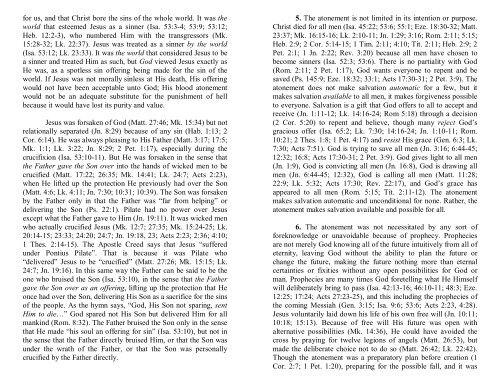


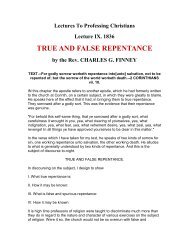
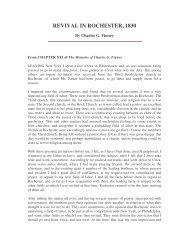

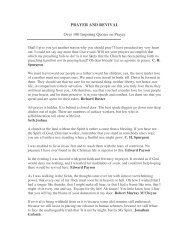
![[PDF] SIX DAYS OR MILLIONS OF YEARS? - Answers in Genesis](https://img.yumpu.com/34887318/1/190x245/pdf-six-days-or-millions-of-years-answers-in-genesis.jpg?quality=85)




